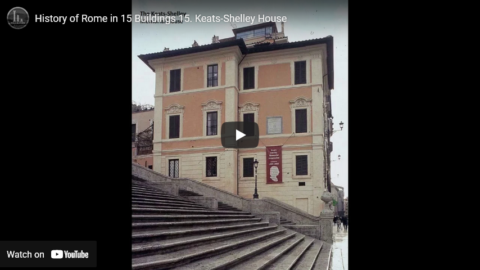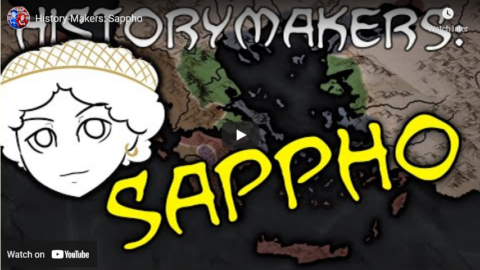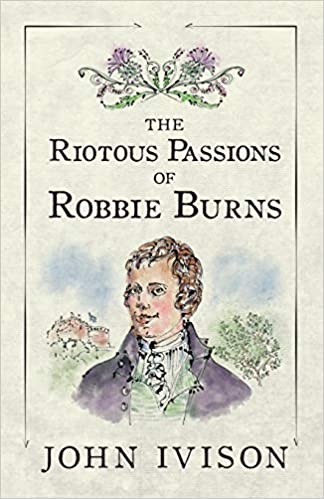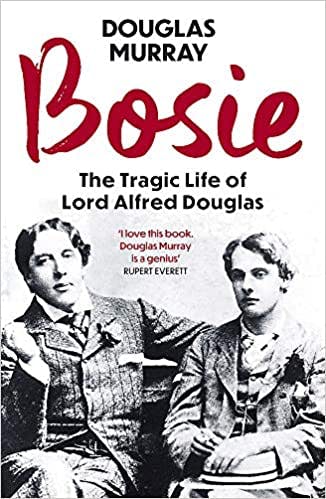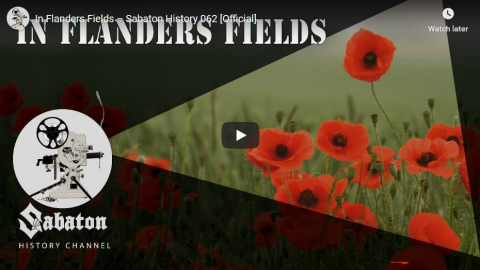toldinstone
Published 2 Oct 2018For well over a century, the “Odes” of John Keats have been boring high school students, enchanting lovers of poetry, and giving scholars of English literature interesting things to overinterpret. When he died in 1821, however, Keats was virtually unknown – an anonymous member of Rome’s large community of travelers and expatriates in the last years of the Grand Tour.
To see the story and photo essay associated with this video, go to:
https://toldinstone.com/keats-shelley…
June 28, 2022
History of Rome in 15 Buildings 15. Keats-Shelley House
April 2, 2022
Afghan Traditional Jezail
Forgotten Weapons
Published 1 Feb 2017The Jezail is the traditional rifle of the Afghan tribal fighter, although it originated in Persia (Iran). Distinctive primarily for its uniquely curved style of buttstock, these rifles still maintain a symbolic importance although they are utterly obsolete.
Every jezail is a unique handmade weapon, but they all share some basic traits. They are typically built around complete lock assemblies, from captured guns or bought/traded parts. The barrel is typically quite long and rifled, and the caliber is generally .50 to .75 inch. Unlike the domestic American flintlock long rifles, the jezail is meant for war and not hunting.
http://www.patreon.com/ForgottenWeapons
Cool Forgotten Weapons merch! http://shop.bbtv.com/collections/forg…
If you enjoy Forgotten Weapons, check out its sister channel, InRangeTV! http://www.youtube.com/InRangeTVShow
January 1, 2022
Merry Olde England
Sebastian Milbank on the often disparaged nostalgic view of “the good times of old England”:
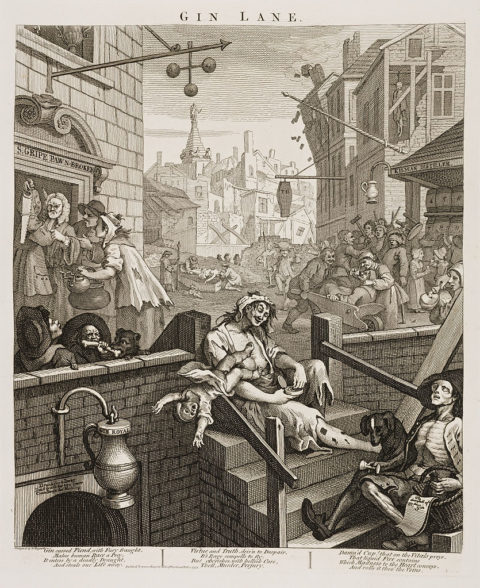
Gin Lane, from Beer Street and Gin Lane. A scene of urban desolation with gin-crazed Londoners, notably a woman who lets her child fall to its death and an emaciated ballad-seller; in the background is the tower of St George’s Bloomsbury.
The accompanying poem, printed on the bottom, reads:
Gin, cursed Fiend, with Fury fraught,
Makes human Race a Prey.
It enters by a deadly Draught
And steals our Life away.
Virtue and Truth, driv’n to Despair
Its Rage compells to fly,
But cherishes with hellish Care
Theft, Murder, Perjury.
Damned Cup! that on the Vitals preys
That liquid Fire contains,
Which Madness to the heart conveys,
And rolls it thro’ the Veins.
Wikimedia Commons.
The decadence and excess of the city is of a piece with puritanical restraint
William Wordsworth wrote:
They called Thee Merry England, in old time;
A happy people won for thee that name
With envy heard in many a distant clime;
And, spite of change, for me thou keep’st the same
Endearing title, a responsive chime
To the heart’s fond belief; though some there are
Whose sterner judgments deem that word a snare
For inattentive Fancy, like the lime
Which foolish birds are caught with. Can, I ask,
This face of rural beauty be a mask
For discontent, and poverty, and crime;
These spreading towns a cloak for lawless will?
Forbid it, Heaven! and Merry England still
Shall be thy rightful name, in prose and rhyme!Merry England is an easily mocked concept in today’s society, but in my view it carries a perennial insight: that the decadence and excess of the city is of a piece with puritanical restraint. Both apparently opposite features reflect an urban sophistication and the ruling imperative of commerce. The moneymaking frenzy of cities like London gave rise to excessive consumption and the relaxing of prior moral and social norms. Yet the 17th century Puritans were in large part cityfolk, alienated from rural tradition and well represented amongst bankers, merchants and urban middle class trades and professions.
William Hogarth’s most famous engraving is Gin Lane, which shows a street filled with people immiserated by the gin craze, a child toppling out of its mother’s arms, emaciated figures dying in the open, madmen dancing with corpses, a pawn-shop with the grandeur of a bank eagerly sucking in objects of domestic industry and converting them into gin money. Less well known is the image that accompanied it, the engraving Beer Street. In this latter engraving, plump and prosperous individuals pause from their labour to receive huge foaming mugs of ale, buxom housemaids flirt with cheerful tipplers, bright inn signs are painted, buildings are going up, and the pawn-shop is going out of business.
Merry England is an image of a society centred on human life and happiness rather than the demands of commerce. Here labour and rest both have their place: noble objects like a fine building and a bounteous meal are provided by hard work, but once completed, time is devoted to appreciating and relishing the finished product. Decoration and adornment are the outward sign of this; they are by their nature a form of abundance. The finite object of labour and production thus gives rise to an infinite realm of feast, celebration, adornment and signification. This enchanted public sphere, shaped to the human person, is limitless within its limits, and points beyond itself to the truly limitless and eternal world of the transcendent.
In the commercially determined sphere of modernity, it is instead work and consumption that are rendered limitless. The objects have become entirely ones of consumption — there is no limit to the consumption of gin, which stands in for all consumer objects. Hogarth shows us the humane objects of household industry — the good cooking pots, the tongs, the saw and the kettle — replaced with money. Liquidity is everywhere, capital has broken down the social order, removing all distinctions of sex, age and class. Now all persons and all things are joined together by a single seamless system of predation.
The alternative that many advocated to this situation was embodied in the Temperance movement: a Puritan-dominated enterprise which saw drinking as a threat to industry as well as the spiritual and moral health of the nation. This is a deep tendency in the British character: the impulse to look upon poverty and distress as a culpable disease and to preach individual self-restraint as the cure. Puritans were often well-to-do, literate townspeople, whose collective refusal to participate in dancing, drama, drinking, gambling, racing and boxing not only set them apart from the boisterous lower orders, but also from the quaffing, hunting, hawking and whoring nobility.
November 3, 2021
QotD: English literature
Here one comes back to two English characteristics that I pointed out, seemingly rather at random, at the beginning of the last chapter. One is the lack of artistic ability. This is perhaps another way of saying that the English are outside the European culture. For there is one art in which they have shown plenty of talent, namely literature. But this is also the only art that cannot cross frontiers. Literature, especially poetry, and lyric poetry most of all, is a kind of family joke, with little or no value outside its own language-group. Except for Shakespeare, the best English poets are barely known in Europe, even as names. The only poets who are widely read are Byron, who is admired for the wrong reasons, and Oscar Wilde, who is pitied as a victim of English hypocrisy. And linked up with this, though not very obviously, is the lack of philosophical faculty, the absence in nearly all Englishmen of any need for an ordered system of thought or even for the use of logic.
George Orwell, “The Lion And The Unicorn: Socialism and the English Genius”, 1941-02-19.
October 25, 2021
QotD: Individual tastes
Taste is not learned out of books; it is not given from one person to another. Therein lies its profundity. At school, fatuous masters would say of poems they didn’t like, using the old Latin saw, De gustibus non disputandem est — there’s no accounting for taste. And so there isn’t. Taste is like a perverse coral: it grows slowly and inexorably into unpredictable shapes, precisely because it’s an offshoot of living iteself. Acquiring taste, then, is not a result of study; it’s a talent for living life.
Lawrence Osborne, The Accidental Connoisseur, 2004.
September 20, 2021
QotD: English jingoism
In England all the boasting and flag-wagging, the “Rule Britannia” stuff, is done by small minorities. The patriotism of the common people is not vocal or even conscious. They do not retain among their historical memories the name of a single military victory. English literature, like other literatures, is full of battle-poems, but it is worth noticing that the ones that have won for themselves a kind of popularity are always a tale of disasters and retreats. There is no popular poem about Trafalgar or Waterloo, for instance. Sir John Moore’s army at Corunna, fighting a desperate rear-guard action before escaping overseas (just like Dunkirk!) has more appeal than a brilliant victory. The most stirring battle-poem in English is about a brigade of cavalry which charged in the wrong direction. And of the last war, the four names which have really engraved themselves on the popular memory are Mons, Ypres, Gallipoli and Passchendaele, every time a disaster. The names of the great battles that finally broke the German armies are simply unknown to the general public.
The reason why the English anti-militarism disgusts foreign observers is that it ignores the existence of the British Empire. It looks like sheer hypocrisy. After all, the English have absorbed a quarter of the earth and held on to it by means of a huge navy. How dare they then turn round and say that war is wicked?
It is quite true that the English are hypocritical about their Empire. In the working class this hypocrisy takes the form of not knowing that the Empire exists. But their dislike of standing armies is a perfectly sound instinct. A navy employs comparatively few people, and it is an external weapon which cannot affect home politics directly. Military dictatorships exist everywhere, but there is no such thing as a naval dictatorship. What English people of nearly all classes loathe from the bottom of their hearts is the swaggering officer type, the jingle of spurs and the crash of boots. Decades before Hitler was ever heard of, the word “Prussian” had much the same significance in England as “Nazi” has to-day. So deep does this feeling go that for a hundred years past the officers of the British Army, in peace-time, have always worn civilian clothes when off duty.
George Orwell, “The Lion And The Unicorn: Socialism and the English Genius”, 1941-02-19.
March 6, 2021
History-Makers: Sappho
Overly Sarcastic Productions
Published 5 Mar 2021It’s no use, dear algorithm, I cannot research, for Sappho has crushed me with longing for lost poetry!
SOURCES & Further Reading: Sappho: fragments by Jonathan Goldberg, “Girl, Interrupted: Who Was Sappho?” for The New Yorker by Daniel Mendelsohn (https://www.newyorker.com/magazine/20…), “Sappho” from The Poetry Foundation (https://www.poetryfoundation.org/poet…)
Our content is intended for teenage audiences and up.
PATREON: https://www.Patreon.com/OSP
PODCAST: https://overlysarcasticpodcast.transi…
DISCORD: https://discord.gg/osp
MERCH LINKS: http://rdbl.co/osp
OUR WEBSITE: https://www.OverlySarcasticProductions.com
Find us on Twitter https://www.Twitter.com/OSPYouTube
Find us on Reddit https://www.Reddit.com/r/OSP/
February 14, 2021
History’s Best(?) Couples — Valentine’s Day Special
Overly Sarcastic Productions
Published 5 Feb 2021Celebrate Valentine’s Day with a look at some of the best couples in history. Well, “Best” is a stretch — definitely most entertaining — but the pairings on display today are FAR from healthy. Enjoy the slow descent into insanity that is “Me Discussing These Stories”.
SOURCES & Further Reading: Suetonius’ Twelve Caesars, Plutarch’s Parallel Lives: Julius Caesar, China: A History by John Keay, “Song of Everlasting Sorrow” by Bai Juyi, Smithsonian Magazine & Biography.com entries on Marie Antoinette & Louis XVI.
Our content is intended for teenage audiences and up.
TRACKLIST: “Scheming Weasel (faster version),” “Local Forecast – Elevator”, “Sneaky Snitch” Kevin MacLeod (incompetech.com)
Licensed under Creative Commons: By Attribution 4.0 License
http://creativecommons.org/licenses/b…PATREON: https://www.Patreon.com/OSP
PODCAST: https://overlysarcasticpodcast.transi…
DISCORD: https://discord.gg/osp
MERCH LINKS: http://rdbl.co/osp
OUR WEBSITE: https://www.OverlySarcasticProductions.com
Find us on Twitter https://www.Twitter.com/OSPYouTube
Find us on Reddit https://www.Reddit.com/r/OSP/
February 6, 2021
QotD: Political virtue signalling in everyday conversation
At the time, I was struck by the presumption — the belief that everyone present would naturally agree — that opposition to Brexit and a disdain of Trump were things we, the customers, would without doubt have in common. That the poem’s sentiment of friendship and community was being soured by divisive smugness escaped our local academic, whose need to let us know how leftwing he is was apparently paramount. The subtext was hard to miss: “This is a fashionable restaurant and its customers, being fashionable, will obviously hold left-of-centre views, especially regarding Brexit and Trump, both of which they should disdain and wish to be seen disdaining by their left-of-centre peers.” And when you’re out to enjoy a fancy meal with friends and family, this is an odd sentiment to encounter from someone you don’t know and whose ostensible job is to make you feel welcome.
It wouldn’t generally occur to me to shoehorn politics into an otherwise routine exchange, or into a gathering with strangers, or to presume the emphatic political agreement of random restaurant customers. It seems … rude. By which I mean parochial, selfish and an imposition — insofar as others may feel obliged to quietly endure irritating sermons, insults and condescension in order to avoid causing a scene and derailing the entire evening. The analogy that comes to mind is of inviting the new neighbours round for coffee and then, just before you hand over the cups to these people you’ve only just met, issuing a lengthy, self-satisfied proclamation on the merits of mass immigration, high taxes and lenient sentencing. And then expecting nodding and applause, rather than polite bewilderment.
David Thompson, “The Blurting”, David Thompson, 2019-09-04.
January 16, 2021
Howard Anglin reviews The Riotous Passions of Robbie Burns
The Line now apparently also does book reviews:
I don’t know what I was expecting before I picked up John Ivison’s new book, The Riotous Passions of Robbie Burns, but it was not this. In my head, I’d already started composing the end of my review. Something round and pat and full of holiday hygge like: “So light the fire, pour yourself a dram of Annandale whisky, and enjoy …” Because Ivison grew up in Dumfries, where Burns spent the last years of his life, I suppose I expected a more personal narrative, not a work of historical fiction. One expects fiction from political journalists in their day jobs, not in a labour of love composed off the clock.
What I really expected was more of Burns’ poetry — the source of his enduring fame, after all — and less of his person, which was the source of his contemporary infamy. Instead, Ivison gives us something more interesting and unusual: the poetry of Burns’ non-poetic speech. Ivison has taken snippets, and sometimes cribbed whole paragraphs from, Burns’s copious surviving correspondence and woven them into dialogue that carries the story of the poet’s stay in Edinburgh between 1786 and 1788. By putting Burns’ actual words into his mouth, even if sometimes out of context, Ivison gives the reader a direct and plausible impression of Burns the man. We hear verbatim both the coarse tavern wit and the elemental passion that spilled into his prolific verse — sometimes into unprintable doggerel (literally: his poems later collected as The Merry Muses of Caledonia were banned as obscene in the U.K. until 1965), sometimes into achingly beautiful verses like “Flow gently, sweet Afton” or “Ae Fond Kiss.”
Ivison’s book sets us in Edinburgh at a time when, as he writes, “it was said if you stood at the Mercat Cross with a pistol, you could hit 50 geniuses, 50 bankers, 50 lawyers and 50 rogues at any given hour” (no doubt allowing for some overlap between latter two categories). Our narrator and guide is the newly-arrived and impressionable young lawyer’s apprentice, John Bruce, a composite and Zelig-like stand in for many young men of the poet’s acquaintance. (The only record of Burns meeting a John Bruce that I can find was a Rev. John Bruce, Minister of the Highland town of Forfar, whom the poet found “pleasant, agreeable and engaging.”) Through Burns, Bruce and the reader are introduced to the ways of women, drink, the printing business, drink, aristocratic libertinism, and a little more drink.
The two main plots, such as they are, link Bruce and Burns to the notorious escapades of Deacon Brodie, whom Burns met in real life, and to the poet’s long, futile, but apparently sincere courtship of the unhappily-married Agnes (sometimes Nancy) Maclehose. The real life letters between Burns and Maclehose, written under the pseudonyms “Sylvander” and “Clarinda,” make for moving reading and, in this telling, for surprisingly convincing dialogue between Burns and Maclehose and between Burns and Bruce. The text is especially affecting when the poet is in the grip of what he called his “low spirits & blue devils” and his usually florid speech turns fatalistic, brooding, and palpably human.
But the plots are not the point of this charming book; they are frames on which to hang Burns’s words and excuses to showcase Edinburgh as it was coming of age as an intellectual and commercial capital, with all the growing pains that entailed. Filling the city with historical characters, Ivison shows us the city as Burns found it, its population bursting out of the overbuilt medieval closes and wynds that lined the Royal Mile running down the hill from the castle and spreading across the North Bridge to New Town and down to the sea port at Leith.
November 22, 2020
Douglas Murray’s Bosie: The Tragic Life of Lord Alfred Douglas
Melanie McDonagh reviews the re-released early work by Douglas Murray:
It would probably have been better for Lord Alfred Douglas to have died young. Had he died when he was still beautiful and youthful looking, he would have remained forever the gilded youth Oscar Wilde loved. That golden Alfred Douglas survives in the famous photograph on the front of Douglas Murray’s book, with Wilde sitting near Bosie, his arm extended behind the boy with something like possessiveness. Instead the boy survived until 1945, worn, lonely and poverty-stricken, his looks withered, his nose pinched, contemptuous of modernity, but still with a redemptive, blistering integrity.
Twenty years after it was first written, Douglas Murray has reissued his fine biography of Bosie: his first book, written in his gap year before he went to Oxford. Looking back now on his precocious work, he thinks he overdid a little his enthusiasm for Douglas’s poetry, understated his toxic anti-Semitism and didn’t quite do justice to the pederastic element of his early sexuality – as Bosie preferred to put it, his tastes were for youth and softness. In practice this could mean 14-year-old boys, even younger, at a time when he and Wilde had reunited following Wilde’s release from prison. Actually, I think Murray’s original estimate of Alfred Douglas’s sonnets was absolutely right; they vary in quality, but as he said, at their best they equalled the poets he most venerated.
Trouble is, not many people think of Alfred Douglas as a poet, even though they might unknowingly quote perhaps his most famous line, about the love that dares not speak its name. But there were literary critics in his own day who compared him to Shakespeare as a writer of sonnets. Remarkably he has fallen almost entirely off the literary radar now, known only as a player in Wilde’s drama, and it is a pity that the success of this biography hasn’t changed that.
One of the services Douglas Murray performs in his biography is simply to reproduce some of his finest verses so we can judge it for ourselves. Indeed, while writing the book he managed to persuade the Home Office to release the copybook in which Alfred Douglas wrote his prison verses, In Excelsis, which the authorities refused to do in his lifetime.
Even in his own time, most people thought of him as the lover of Oscar Wilde, a byword for a bugger, the boy who brought about Wilde’s destruction through the vengeful malice of his unbalanced father. That perception was powerfully reinforced by Wilde’s terrible letter written from prison, De Profundis, in which he empties his bitterness against the youth he loved in an outpouring of emotion which was in many respects unjust and untrue, especially about Bosie’s financial support for Wilde. Fatally, the letter was never given to him by Robert Ross, Wilde’s friend, and only released in full during a devastating court case.
October 8, 2020
QotD: Yeats really captured the spirit of 2020 a hundred years ago
The Second Coming
By William Butler Yeats, 1919Turning and turning in the widening gyre
The falcon cannot hear the falconer;
Things fall apart; the centre cannot hold;
Mere anarchy is loosed upon the world,
The blood-dimmed tide is loosed, and everywhere
The ceremony of innocence is drowned;
The best lack all conviction, while the worst
Are full of passionate intensity.Surely some revelation is at hand;
Surely the Second Coming is at hand.
The Second Coming! Hardly are those words out
When a vast image out of Spiritus Mundi
Troubles my sight: somewhere in sands of the desert
A shape with lion body and the head of a man,
A gaze blank and pitiless as the sun,
Is moving its slow thighs, while all about it
Reel shadows of the indignant desert birds.
The darkness drops again; but now I know
That twenty centuries of stony sleep
Were vexed to nightmare by a rocking cradle,
And what rough beast, its hour come round at last,
Slouches towards Bethlehem to be born?
September 1, 2020
April 10, 2020
“In Flanders Fields” – Sabaton History 062 [Official]
Sabaton History
Published 9 Apr 2020“In Flanders fields the poppies blow, between the crosses, row on row.” These words, written by John McCrae in his famous war poem “In Flanders Fields”, immortalize death and dying in the Great War like only a few others. It is said, that shortly after the death of his dear friend, McCrae looked over the parapet and onto the battlefield once more. In all the mayhem, the smoke, the exploding shells and the dead bodies on the ground, he saw that the little red flowers, the poppies, still grew. After a strong wind, their pedals would fly across the field, and lay there strewn, like the blood that was shed by the soldiers that had to die there.
Support Sabaton History on Patreon: https://www.patreon.com/sabatonhistory
Listen to “In Flanders Fields” on the Album The Great War here:
CD: http://nblast.de/SabatonTheGreatWar
Spotify: https://sabat.one/TheGreatWarSpotify
Apple Music: https://sabat.one/TheGreatWarAppleMusic
iTunes: https://sabat.one/TheGreatWarItunes
Amazon: https://sabat.one/TheGreatWarAmazon
Google Play: https://sabat.one/TheGreatWarGooglePlayWatch the Official Lyric Video of “In Flanders Fields” here:
https://www.youtube.com/watch?v=ZPgZn…Check out the trailer for Sabaton’s new album The Great War right here: https://www.youtube.com/watch?v=HCZP1…
Listen to Sabaton on Spotify: http://smarturl.it/SabatonSpotify
Official Sabaton Merchandise Shop: http://bit.ly/SabatonOfficialShopHosted by: Indy Neidell
Written by: Markus Linke and Indy Neidell
Directed by: Astrid Deinhard and Wieke Kapteijns
Produced by: Pär Sundström, Astrid Deinhard and Spartacus Olsson
Creative Producer: Joram Appel
Executive Producers: Pär Sundström, Joakim Broden, Tomas Sunmo, Indy Neidell, Astrid Deinhard, and Spartacus Olsson
Post-Production Director: Wieke Kapteijns
Edited by: Karolina Dołęga
Sound Editing by: Marek Kaminski
Maps by: Eastory – https://www.youtube.com/c/eastoryArchive by: Reuters/Screenocean https://www.screenocean.com
Music by Sabaton.An OnLion Entertainment GmbH and Raging Beaver Publishing AB co-Production.
© Raging Beaver Publishing AB, 2019 – all rights reserved.
April 8, 2020
QotD: Iliad, Odyssey, and Anabasis
I read the trio in the order listed above and the reading got better with each title.
The Iliad is epically epic, rendered in a stiff dactylic hexameter with many, many, many repeating phrases. Between “rosy-fingered dawn” and “the wine-dark sea,” Homer’s epithets lull the reader into a trance, which I suppose was the point in oral storytelling. As a result, the myriad battles and names start blending together.
But, man, those battles are brutal. The semi-divine soldiers are walking Cuisinarts, leading to lovely vignettes like this:
Next Erymas was doom’d his fate to feel,
His open’d mouth received the Cretan steel:
Beneath the brain the point a passage tore,
Crash’d the thin bones, and drown’d the teeth in gore:
His mouth, his eyes, his nostrils, pour a flood;
He sobs his soul out in the gush of blood.Spoiler alert: Erymas didn’t make it. As you can see, I read the older translations of these works; the above is Alexander Pope’s translation. I wanted the feel of the original, so I didn’t hunt down the modern versions. All three books are decidedly un-“woke.”
For The Odyssey, I chose the Harvard Classics version translated by Samuel Butler. This epic was far more interesting (and fun!) than the grim, brain-splattered Iliad. Ulysses slides into a Mediterranean port, feasts on great food, charms exotic women, grabs a pile of loot, and is off to the next isle.
Granted, the fellow gets in a few scrapes along the way, even being forced into love slavery by an eternally gorgeous nymph (poor guy), but returns home after 20 years to wreak vengeance on the cads trying to bed his wife. (Monogamy was pretty much a one-way street in ancient Hellas.)
After reading both of Homer’s works, I think The Iliad is geared toward young men, especially those of a military mindset. It’s all heroism, glory, and honor. I really should have tackled this in my Navy days.
The Odyssey is an even better adventure, but its themes of home, wisdom, fatherhood, and marriage are aimed squarely at those of us with more mileage on the drivetrain. The heroes still kill their share of monsters and men, but Ulysses always chooses brains before brawn.
The real revelation for me was Anabasis by Xenophon. How Hollywood hasn’t released a trilogy of this epic is beyond me. (No, The Warriors doesn’t count.) Here are the Cliffs Notes for this real-life tale:
Cyrus the Younger wants to topple his brother Artaxerxes II from the Persian throne, so he recruits 10,000 Greek mercenaries (including Xenophon) to help. They march 1,500 miles from the east coast of modern-day Turkey to the middle of modern-day Iraq and, in the first big battle, Cyrus is killed.
Uh oh.
Now, the entire Persian army opposes the Greeks. The pro-Cyrus Persians say, “No actually, we were for Artaxerxes the whole time!” and turn against the Greeks. The Hellenic generals ask the King for safe passage … and he murders them.
Xenophon is more a philosopher than soldier, but he gives an inspiring speech, the troops elect him leader, and they all hightail it due north while anyone, everyone, and everything tries to kill them.
They cross deserts and rivers and mountains through searing heat, waist-deep snow, and constant attacks from ahead and behind by an ever-hostile collection of bronze-age barbarians. Upon hitting Turkey’s north shore, they finally enter a Greek colony. Happy ending, right? Well, that’s when the soldiers start turning on each other.
Granted, Anabasis is an amazing war story, but it also serves as a history, an ancient travel guide, and a primer in leadership, group dynamics, and human nature.
If you haven’t read any of these three books, you should make up that deficit.
Jon Gabriel, “My Month in Ancient Greece”, Ricochet, 2018-01-23.

